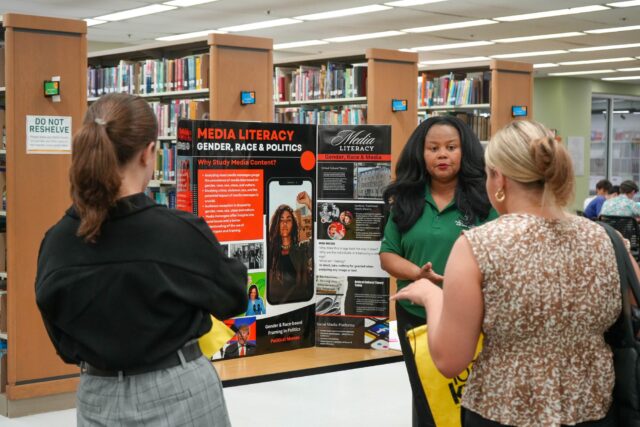By Olivia Turner | Arts & Life Editor
Amidst the turmoil of modern news, television and social media, Baylor journalism professors have been looking out for their students. Professors took students on an educational journey titled “Passport to Media Literacy,” Wednesday afternoon in the garden level of Moody Library.
Topics such as media funding, AI, fact checking and fake news were put under a microscope during the event. Tri-fold display boards, slideshows and even games were used to help students better understand what types of media are reliable. After visiting each booth, students’ media passports were stamped, allowing them to receive a Dr Pepper float once they had finished the experience.
Rachel Velasco, the community engagement coordinator for KWBU, used a matching game in which students connected names of media outlets to their genre of funding.
“The big challenge that all of us have right now is that we’re getting inundated with information all the time,” Velasco said. “How can you know who wants you to hear that message? There’s always a reason that a message is being given to you.”
Velasco said that there is reliability to be found in subscription, corporate and advertising services, but that publicly-funded organizations aren’t motivated by money, which increases trustworthiness for consumers.
“That doesn’t mean they don’t have bias,” Velasco said. “You still have to evaluate those sources individually once you hear them.”
Dr. Alec Tefertiller spoke to students on the deception of AI. He said AI often has trouble accurately portraying patterns, hair, fabrics, skin and appendages, which can differentiate itself from real photography.
Tefertiller used examples such as the viral AI-generated photo of Pope Francis in a Balenciaga puffer jacket to demonstrate the difficulty of recognizing when a photo is AI. The answer to finding truth, he said, is often through a quick Google search.
“Look for reputable organizations and see if they’re covering it,” Tefertiller said. “A lot of instances, especially when it involves a celebrity or a politician, you’ll be able to find a very critical, reputable source.”
Google also has another tool for checking the authenticity of photos called Google Lens, Tefertiller said. All one has to do is enter a link or upload an image to fact-check an AI-generated image, he said.
Seabrook senior Lauren Hooker said every different station she visited throughout the duration of the event taught her something.
“It’s really interesting seeing that side of things and how with a community like this, the radio station is funded by the community,” Hooker said, referencing KWBU’s booth. “I think media literacy is so important because there’s just so much going on in our world right now.”



